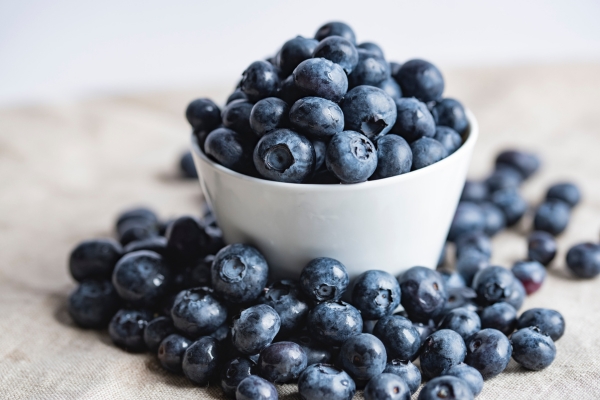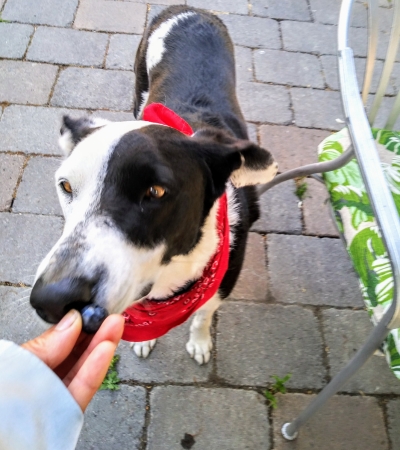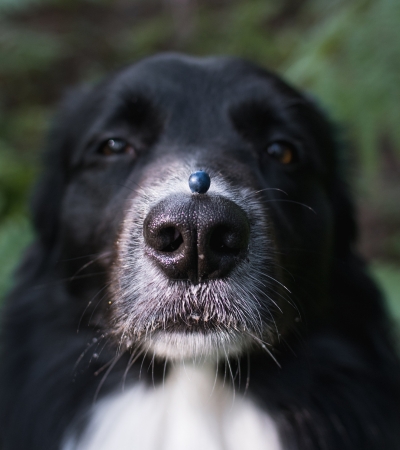Can Dogs Eat Blueberries? A Superfood for Super Canines

Can Dogs Eat Blueberries? The Superfood of the Canine World
Blueberries are delicious and known for the immense health benefits they offer us. We’re not talking about the cheesecake you often find underneath the blueberry or that fruit-laden muffin, but the fruit itself is one of the original superfoods.
So, do these health perks crossover into the canine kingdom? Can dogs eat blueberries?
Let’s find out if these tiny berries should be part of your pooch’s five-a-day.
Can Dogs Eat Blueberries? Contents
What Are the Benefits of Blueberries for Dogs?
When Are Blueberries Bad for Dogs?
Are Blueberries Poisonous to Dogs?
How Many Blueberries Can a Dog Eat?

Can Dogs Eat Blueberries?
Yes, they can.
Although there are many berries or fruits you should never offer your dog, the super blueberry is one treat your dog will love and is also good for them.
Blueberries are packed with nutrients (more on this later) that are great for your pooch’s general health — helping your furry friend to enjoy a happier and longer life. So, next time you’re enjoying blueberry pancakes with the family, save a few for your pooch — just hold back on the pancakes and syrup.
Can Puppies Eat Blueberries?
Sure, your pup can try them.
You can offer blueberries whole, as a treat, or mash them up and mix them with your pup’s regular food to prevent choking hazards.
Can Dogs Have Dried Blueberries?
Dried blueberries can be the ideal way of carrying your doggy treats in your pocket for the occasional reward. If you have a dehydrator at home, it’s best to prepare your own dried blueberries for your pup.
However, store-bought blueberries often contain preservatives and have a higher sugar content, which can be bad for your pup’s delicate stomach.
Also, remember the blueberry will get harder when dried and may present a potential choking hazard to smaller dogs.

What Are the Benefits of Blueberries for Dogs?
When somebody asks, are blueberries good for dogs or are blueberries safe for dogs? There are many reasons you could offer why they should be feeding their pet blueberries. Blueberries are completely non-toxic for most dogs and can be a healthy alternative snack for your pup.
Blueberry for dogs benefits include:
Vitamins and Minerals
Blueberries are a natural source of vitamins C, K, and A. Vitamin C supports a dog's immune system, aiding in fighting off infections and promoting overall health. Vitamin K is essential for blood clotting, helping to prevent excessive bleeding in case of injuries. Vitamin A, also found in carrots, is responsible for good eyesight.
Other nutrients in blueberries include:
Calcium.
Phosphorous.
Potassium.
Magnesium.
Antioxidants
These small but mighty berries are bursting with antioxidants, particularly anthocyanins, which help neutralize harmful free radicals in the body. These antioxidants may protect dogs from oxidative stress and reduce the risk of chronic diseases. As a bonus, studies have discovered that antioxidants can slow down the aging process of dogs aged over six years old.
Fiber
Rich in dietary fiber, blueberries promote a healthier digestive system. This can be particularly beneficial for dogs with gastrointestinal issues or irregular bowel movements.
Low in Calories
With their relatively low-calorie content, blueberries are a healthy treat or snack for dogs that need to maintain or lose weight.
Natural Sugars
The natural sugars found in blueberries give them a sweetness that makes them appealing to pups. They also act as a healthier alternative to sugary processed treats. Although, like any treat, you should exercise moderation.
When Are Blueberries Bad for Dogs?
Generally for most dogs, they aren't. However, blueberries are naturally high in sugars, and you should avoid feeding them to a dog that has diabetes, is on a prescription diet for other medical conditions, or has a sensitivity to certain food types. If in doubt, check with your vet.

Can Dogs Have Frozen Blueberries?
Although blueberries in their natural state are quite small and soft, if served frozen, they can present a choking hazard, especially to smaller breeds of dogs. For a safer way to prepare frozen blueberries, check out our section on How Can You Feed Dogs Blueberries?
Are Blueberries Poisonous to Dogs?
No, but sometimes fresh blueberries may have been sprayed with pesticides which can be toxic for your pup. Therefore, ensure you rinse the fruit beforehand. Even organic blueberries may have come into contact with other toxic or poisonous fruits for dogs.
And, while we’ve established blueberries are safe for dogs, other berries can be toxic for your pooch, including:
Marionberries.
Gooseberries.
Salmonberries.
Holly berries.
Juniper berries.
Dogwood berries.
Pokeberries.
Mistletoe berries.
Should you catch your dog munching on not-dog-friendly berries, contact your vet straight away. They will be able to check and advise the best course of treatment.
How Many Blueberries Can a Dog Eat?
Even though blueberries are “super” healthy, too much of any food, especially when they are high in natural sugars and fiber, can upset your dog’s stomach or even cause diarrhea. Plus, treats should make up less than 10 percent of your dog’s daily diet, with the remaining 90 percent being well-balanced nutritional dog food.
Here are some general guidelines on how many blueberries can dogs eat depending on their size:| Size of Dog | Breed Examples | Portion Size (No. Pieces) |
|---|---|---|
| Extra Small/Toy (2-20 lbs) | Yorkie, Chihuahua, Pug, Bichon Frise | 1 - 2 |
| Small (21-30 lbs) | Basenji, Beagle, Boston Terrier | 2 - 3 |
| Medium (31-60 lbs) | Vizslas, Basset Hound, Border Collie | 3 - 5 |
| Large (61-90 lbs) | Pitbull, Labrador Retriever, Afghan Hound | 5 - 6 |
| Extra Large (91+ lbs) | Newfoundland, Bernese Mountain Dog, Briard | 8 - 12 |
How Can You Feed Dogs Blueberries?
Fresh blueberries can be a delicious treat for your dog. There are several options when it comes to feeding your pup blueberries, including:
Raw — ensure you wash them and remove the stems. Blueberries can be quite small and don’t need chopping for most dogs.
Popsicle/Slush Puppie — as a cooling treat, puree the blueberries and freeze with water for a popsicle or put inside their Kong toy as a frozen slushy treat.
Dried — dehydrate your blueberries at home and then use in moderation as a reward when training your companion. Be careful though, as dried blueberries in excessive amounts could potentially dehydrate your pup.
Puree — mix some blueberries with other dog-friendly fruits, such as bananas or strawberries, and puree in a blender. Adding a little plain, sugar and xylitol-free yogurt, or a small amount of peanut butter can transform the mixture into a healthy smoothie for your pup.
You can also mix blueberries into your dog’s regular food if they don’t necessarily enjoy the taste of them but you still want to offer the benefits of all those nutrients.

Final Thoughts
Blueberries can be a healthy addition to your dog's diet, providing valuable nutrition. However, as with any new food, it's essential to introduce blueberries gradually and in moderation to avoid any potential digestive issues or allergies.
Next time somebody asks you, can dogs eat blueberries? You can tell them definitely yes! Just keep the muffins and cheesecakes out of paws reach.Can Dogs Eat Blueberries? FAQs
Can Dogs Eat Blueberry Yogurts?
It’s not the best idea. Store-bought blueberry yogurt is likely to be full of sugar and additives, which can upset your dog’s stomach. And, over time, excess sugar can also contribute to obesity, diabetes, and maybe even lead to cavities.
Store-bought yogurts may also contain xylitol which is toxic for dogs. So instead, why not try buying plain natural yogurt and mashing up a few berries into the pot?
What Fruits Are Not Good for Dogs?
Along with the toxic berries we mentioned earlier, there are several other fruits you shouldn’t feed your dog:
Avocados and cherries — seeds contain persin or cyanide, which is toxic to dogs.
Grapes and raisins — can induce kidney failure.
Tomato — the unripe (green) fruit and the plant contains a toxin called solanine.
Are Blueberries Good for Dogs with Kidney Disease?
While introducing new food to your dog's diet with kidney disease requires caution, blueberries can be an excellent choice. They boast high levels of antioxidants, which help combat toxins, and an abundance of fiber to support gentle digestion.
Can Dogs Eat Blueberry Pop Tarts?
No, Pop-Tarts contain many ingredients, such as artificial flavoring and coloring agents, that may cause allergic reactions or other health issues if consumed by your pup. They’re also high in various sugars and wheat flours, which can be a problem for some dogs.
Can You Give Dogs Blueberries With Skin On?
Yes. Blueberries are safe for dogs to eat — skin and all. But, you may want to remove the stalks first, as these could be a choking hazard.


